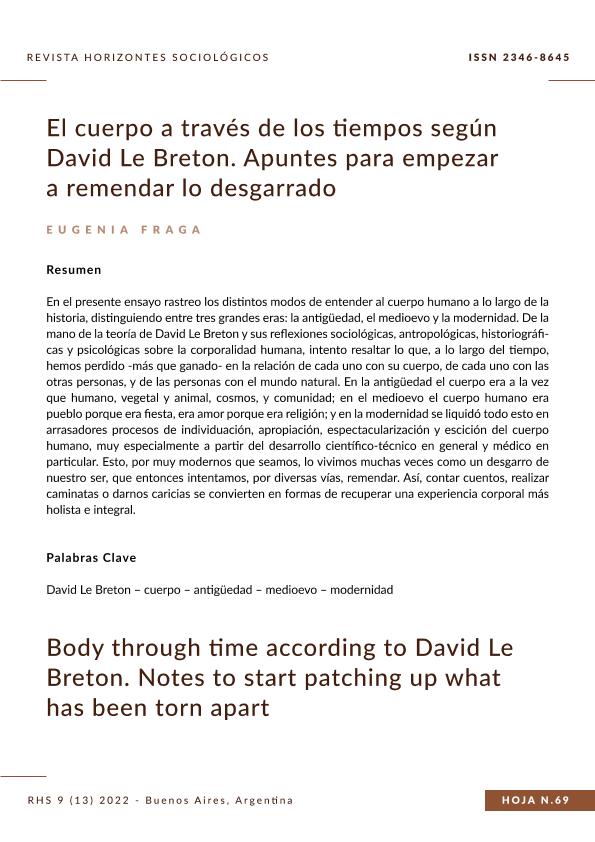Mostrar el registro sencillo del ítem
dc.contributor.author
Fraga, Eugenia

dc.date.available
2023-11-30T18:49:33Z
dc.date.issued
2022-12
dc.identifier.citation
Fraga, Eugenia; El cuerpo a través de los tiempos según David Le Breton: Apuntes para empezar a remendar lo desgarrado; Asociación Argentina de Sociología; Horizontes Sociológicos; 9; 13; 12-2022; 69-79
dc.identifier.issn
2346-8645
dc.identifier.uri
http://hdl.handle.net/11336/218934
dc.description.abstract
En el presente ensayo rastreo los distintos modos de entender al cuerpo humano a lo largo de la historia, distinguiendo entre tres grandes eras: la antigüedad, el medioevo y la modernidad. De la mano de la teoría de David Le Breton y sus reflexiones sociológicas, antropológicas, historiográficas y psicológicas sobre la corporalidad humana, intento resaltar lo que, a lo largo del tiempo, hemos perdido -más que ganado- en la relación de cada uno con su cuerpo, de cada uno con las otras personas, y de las personas con el mundo natural. En la antigüedad el cuerpo era a la vez que humano, vegetal y animal, cosmos, y comunidad; en el medioevo el cuerpo humano era pueblo porque era fiesta, era amor porque era religión; y en la modernidad se liquidó todo esto en arrasadores procesos de individuación, apropiación, espectacularización y escición del cuerpo humano, muy especialmente a partir del desarrollo científico-técnico en general y médico en particular. Esto, por muy modernos que seamos, lo vivimos muchas veces como un desgarro de nuestro ser, que entonces intentamos, por diversas vías, remendar. Así, contar cuentos, realizar caminatas o darnos caricias se convierten en formas de recuperar una experiencia corporal más holista e integral.
dc.description.abstract
In this essay I trace the different ways of understanding the human body throughout history, distinguishing between three great eras: Ancient times, the Middle ages and Modernity. Hand in hand with David Le Breton's theory and his sociological, anthropological, historiographical and psychological reflections on human corporality, I try to highlight what, over time, we have lost -more than gained- in the relationship of each one with our body, of each other with other people, and of people with the natural world. In antiquity the body was at the same time human, vegetable and animal, cosmos, and community; later the human body was people because it was a party, it was love because it was religion; and in modernity all this was liquidated in sweeping processes of individuation, appropriation, spectacularization and division of the human body, especially from scientific-technical development in general and medical development in particular. This, no matter how modern we are, we often experience as a tear in our being, which we then try, in various ways, to mend. Thus, telling stories, taking walks or giving ourselves caresses become ways of recovering a more holistic and integral bodily experience.
dc.format
application/pdf
dc.language.iso
spa
dc.publisher
Asociación Argentina de Sociología
dc.rights
info:eu-repo/semantics/openAccess
dc.rights.uri
https://creativecommons.org/licenses/by-nc-sa/2.5/ar/
dc.subject
David Le Breton
dc.subject
Cuerpo
dc.subject
Antigüedad
dc.subject
Medioevo
dc.subject
Modernidad
dc.subject.classification
Otras Sociología

dc.subject.classification
Sociología

dc.subject.classification
CIENCIAS SOCIALES

dc.title
El cuerpo a través de los tiempos según David Le Breton: Apuntes para empezar a remendar lo desgarrado
dc.title
Body through time according to David Le Breton: Notes to start patching up what has been torn apart
dc.type
info:eu-repo/semantics/article
dc.type
info:ar-repo/semantics/artículo
dc.type
info:eu-repo/semantics/publishedVersion
dc.date.updated
2023-11-29T13:18:33Z
dc.journal.volume
9
dc.journal.number
13
dc.journal.pagination
69-79
dc.journal.pais
Argentina

dc.description.fil
Fil: Fraga, Eugenia. Consejo Nacional de Investigaciones Científicas y Técnicas; Argentina. Universidad de Buenos Aires. Facultad de Ciencias Sociales. Instituto de Investigaciones "Gino Germani"; Argentina
dc.journal.title
Horizontes Sociológicos
dc.relation.alternativeid
info:eu-repo/semantics/altIdentifier/url/https://aasociologia.wordpress.com/revista-horizontes-sociologicos/
Archivos asociados
